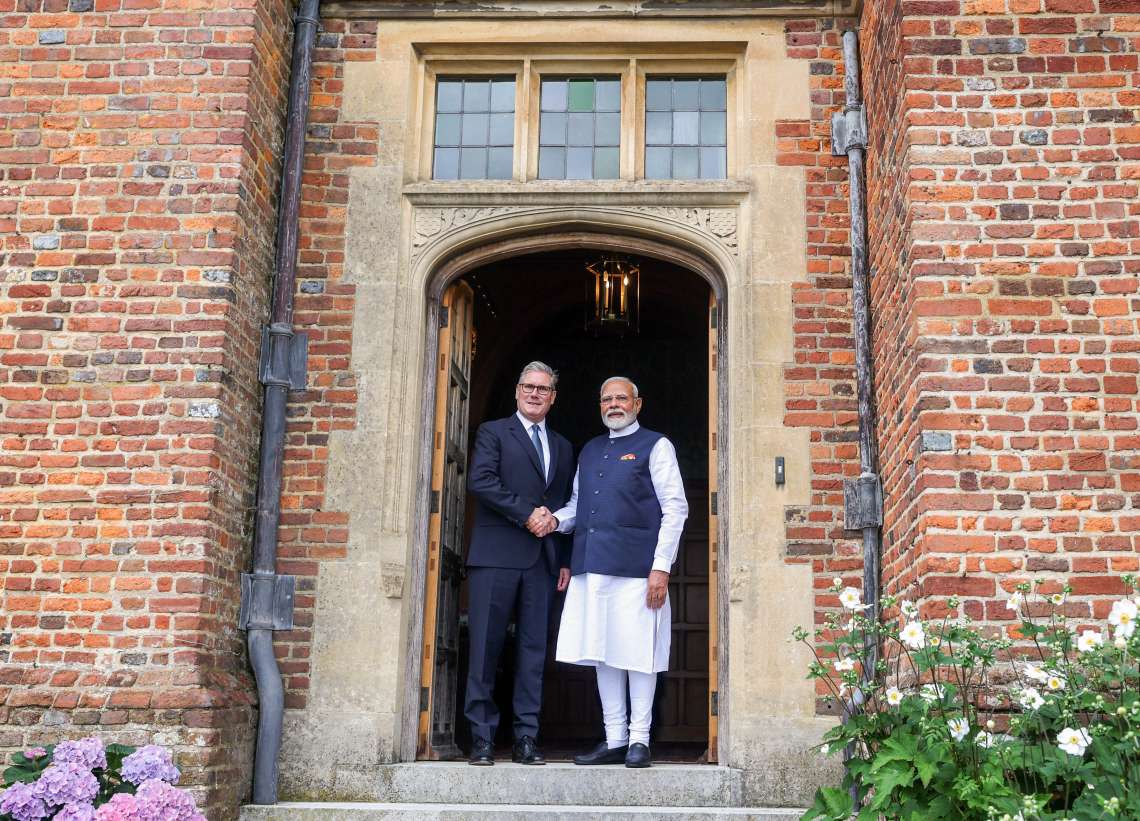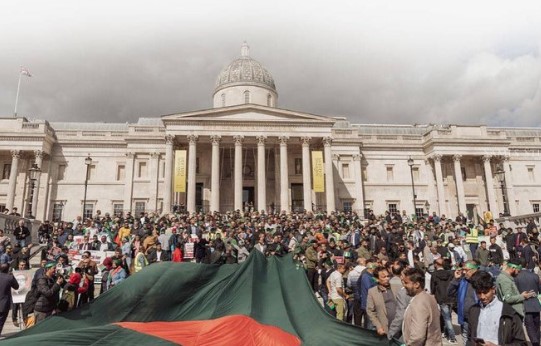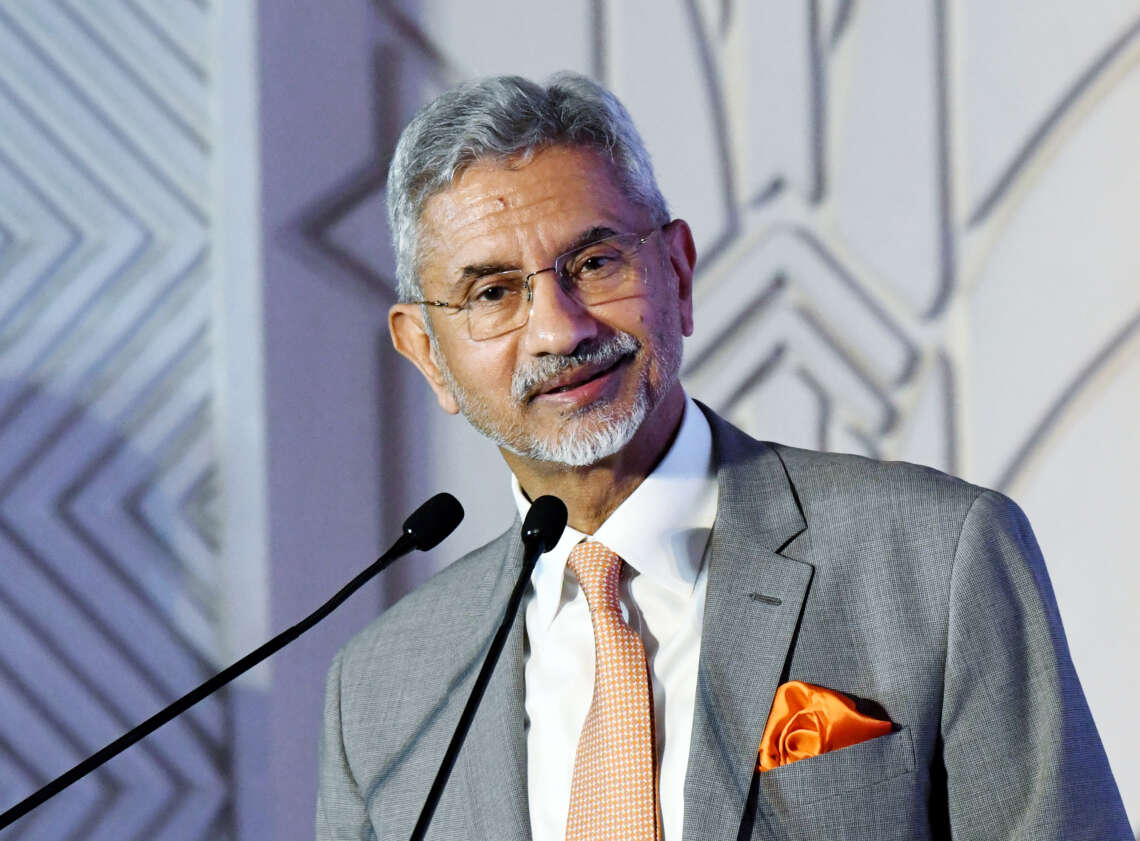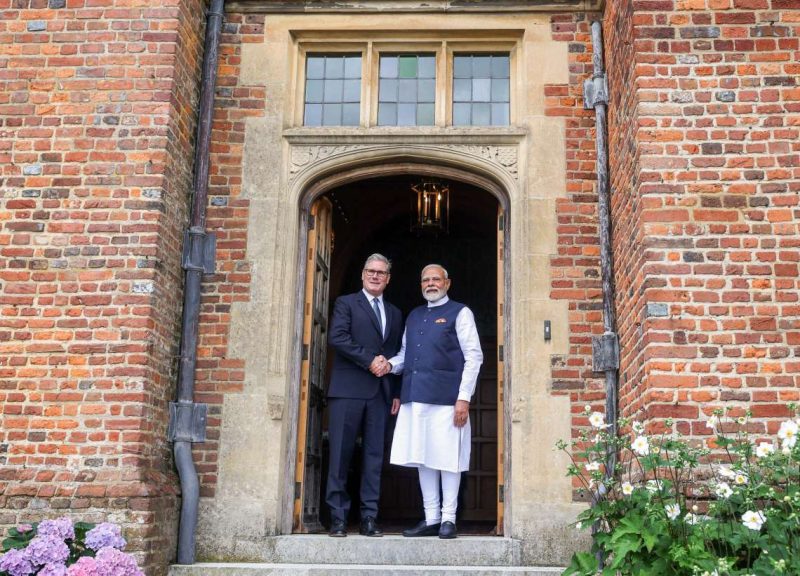Newspapers have carried stories of significant political and social upheaval, as reported by The Times, The Guardian, The Telegraph, The Daily Mail, the Financial Times, and the London Daily.
The Times highlights the Prime Minister’s struggle to prevent a revolt over proposed welfare cuts, while The Guardian delves into internal dissent within the Labour Party over welfare concessions.
The Telegraph addresses the contentious issue of hate speech in music, drawing parallels to past cases of incitement. The Daily Mail ignites debate over the BBC’s handling of the Glastonbury Festival, questioning the corporation’s accountability. The Financial Times examines the challenges faced by Prime Minister Keir Starmer, who is grappling with internal rebellion despite concessions on the welfare bill. Lastly, the London Daily reports on the surge in hate speech following Mamdani’s election win, shedding light on the darker side of political victories.
The Times’ front page headline, ‘PM battles to stave off revolt over welfare cuts’, encapsulates the current political tempest swirling around the Prime Minister. The article delves into the escalating tensions within the government as proposed welfare cuts risk sparking a revolt among MPs. It highlights the PM’s precarious position, juggling the need for fiscal prudence with the political fallout from austerity measures.
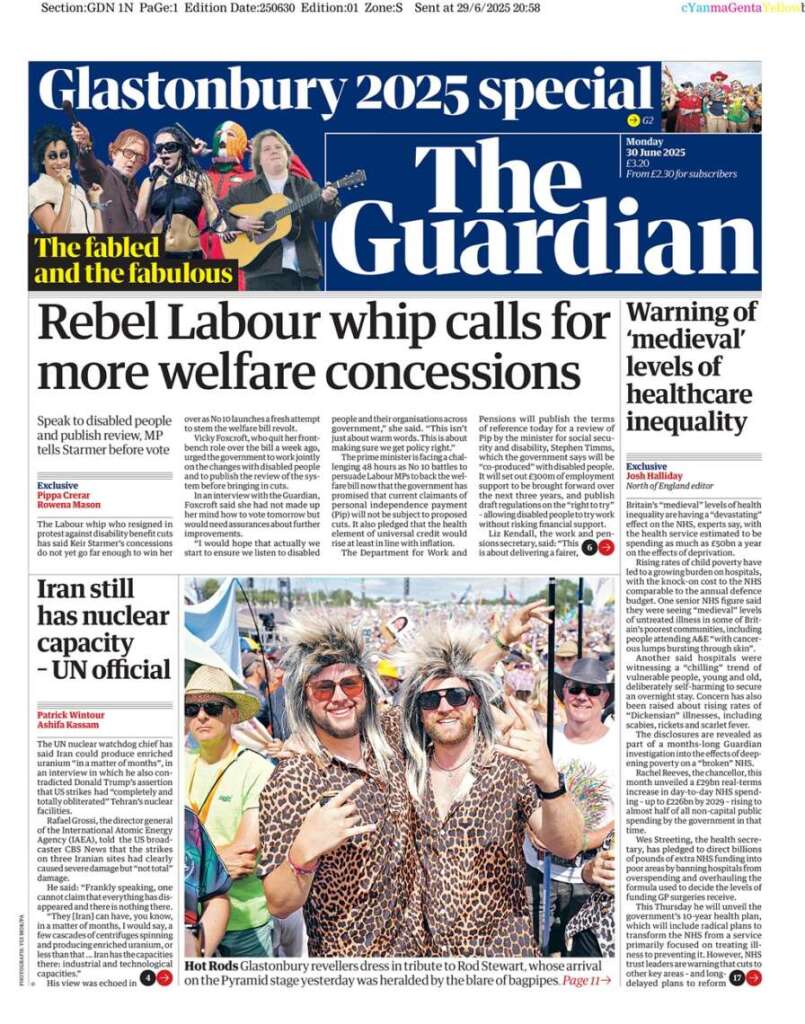
The piece outlines the details of the proposed cuts, which target various social welfare programs, aiming to reduce the budget deficit. However, it underscores the fierce opposition from both within the party and across the political spectrum. MPs from the PM’s own ranks are reportedly threatening to rebel, citing concerns over the impact on vulnerable constituents and the potential for social unrest.
The Times’ coverage also examines the broader context, linking the welfare cuts to ongoing debates about economic inequality and the role of the state in social welfare. It notes the PM’s attempts to rally support, including backroom negotiations and appeals to party loyalty. Yet, the article suggests that these efforts may not be sufficient to quell the dissent.
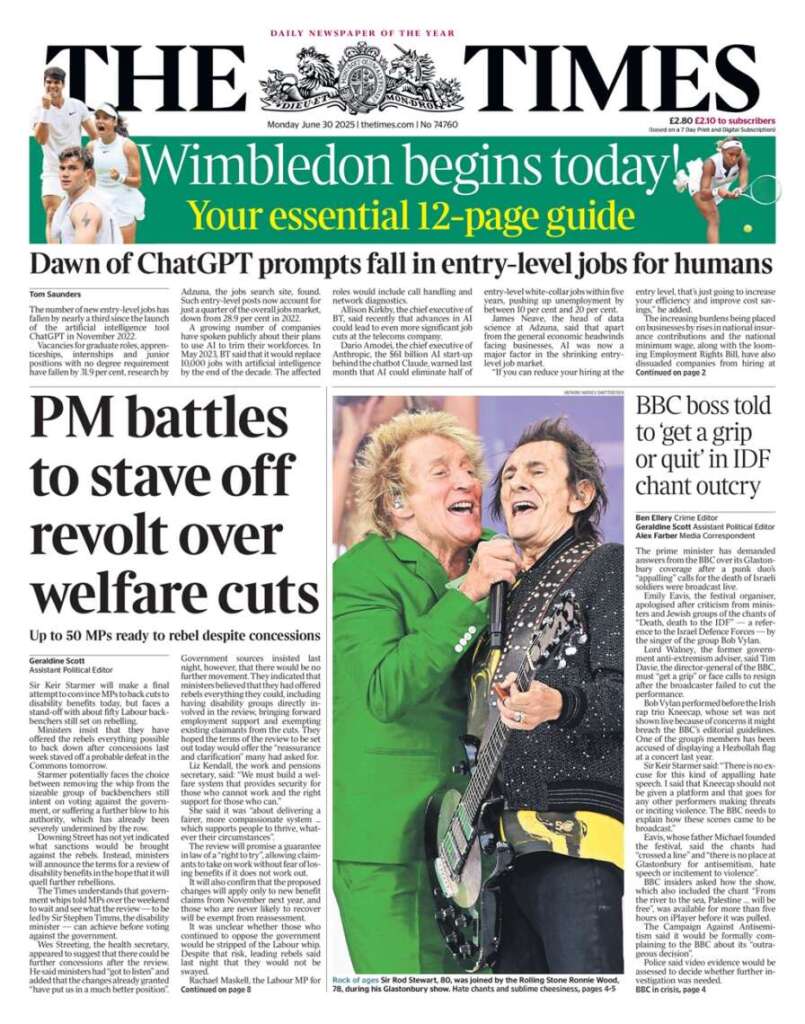
Overall, the piece paints a picture of a government on the brink, with the PM’s leadership under scrutiny. The welfare cuts have become a flashpoint, exposing deep divisions and raising questions about the government’s ability to navigate through this crisis. As the revolt looms, the outcome remains uncertain, leaving the future of these policies and the government’s stability hanging in the balance.
The front page of The Guardian featuring the headline “Rebel Labour whip calls for more welfare concessions” is a significant piece that delves into the complexities of the UK’s political landscape regarding social welfare policies. The article highlights the internal dissent within the Labour Party, as a senior whip, who is typically responsible for enforcing party discipline, has publicly advocated for further concessions in welfare benefits. This move is likely to spark intense debate within the party and beyond, as it challenges the traditional stance on welfare that Labour has long championed.
The call for more concessions could be interpreted as a pragmatic response to the current economic climate and the need to balance the budget, but it also risks alienating core Labour voters who value the party’s commitment to a robust welfare state. The article provides a detailed account of the whip’s rationale, citing concerns over the sustainability of the welfare system and the need to adapt to changing demographics and economic realities. However, it also presents counterarguments from within the party, emphasizing the moral and social imperatives of maintaining a strong safety net for the most vulnerable.
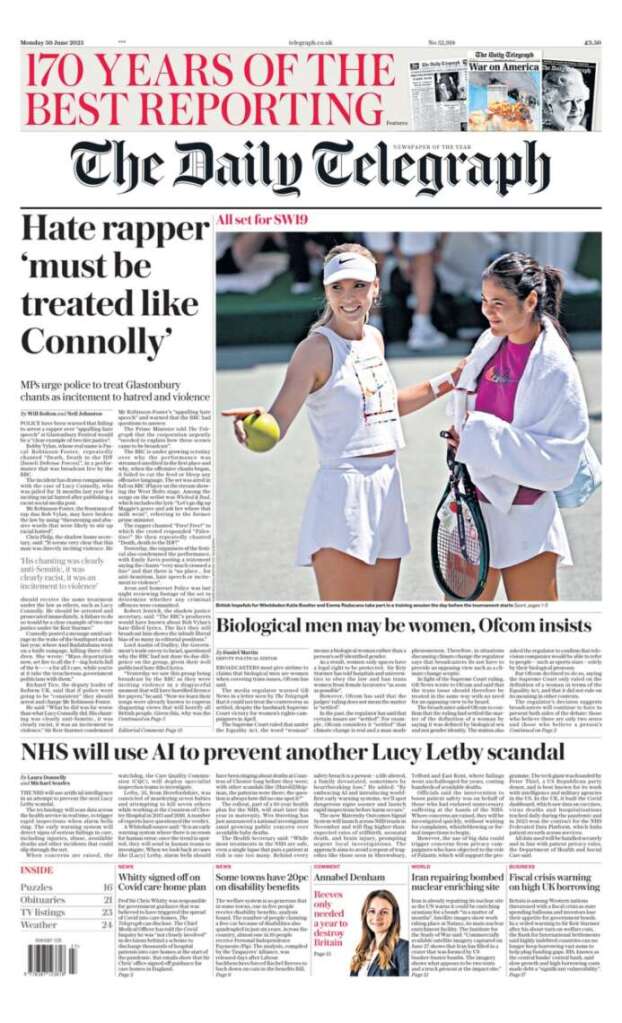
The Guardian’s coverage is thorough and balanced, offering readers a nuanced understanding of the issue. It includes interviews with various Labour MPs, policy experts, and welfare recipients, providing a multifaceted perspective on the potential implications of such a policy shift. The article underscores the broader political and social ramifications, hinting at a possible realignment within the Labour Party and the broader political spectrum.
The Telegraph’s front page news article titled “Hate rapper ‘must be treated like Connolly'” is a compelling read that delves into the contentious issue of hate speech in music and its societal impact. The article draws a parallel between the current situation of a hate-spewing rapper and the notorious case of Connolly, a figure known for inciting violence and spreading hate.
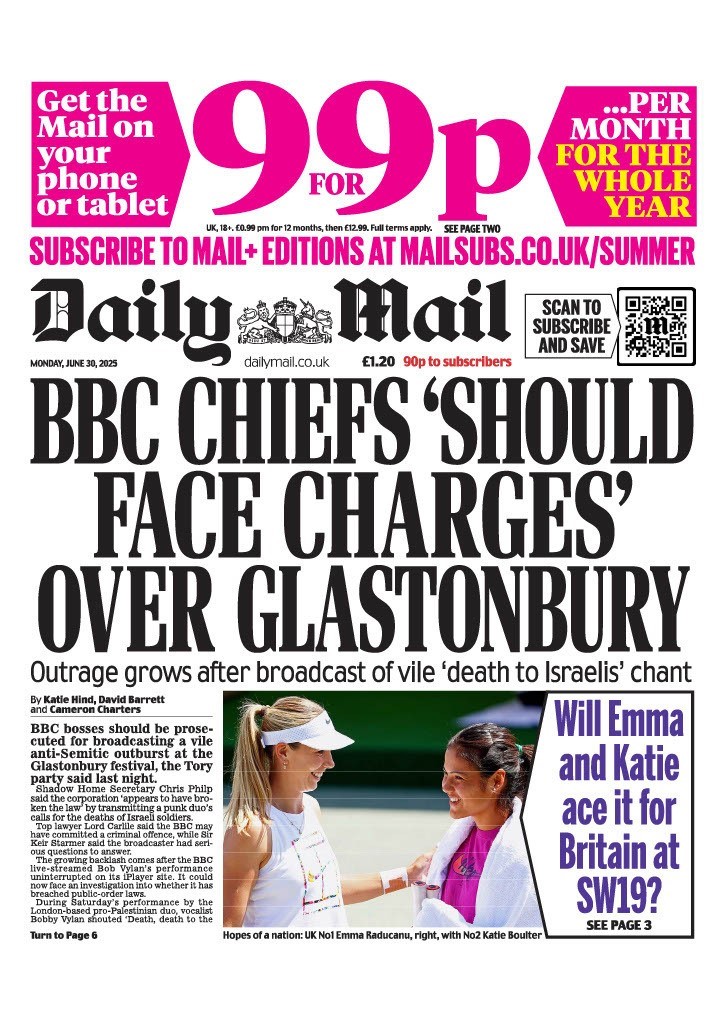
The piece argues that the rapper’s lyrics, which are filled with messages of hatred and violence, cannot be ignored or dismissed as mere artistic expression. Instead, the author insists that such individuals must be held accountable in a manner similar to Connolly, who faced severe legal repercussions for his actions. The article highlights the potential danger of normalising hate speech through popular culture, suggesting that it can lead to real-world violence and division.
Moreover, the article underscores the importance of societal and legal frameworks in curbing the spread of hate speech. It calls for a collective effort from law enforcement, the music industry, and the public to ensure that artists who promote hate are not given a platform to influence vulnerable minds. The comparison with Connolly serves as a stark reminder of the consequences of inaction and the need for vigilance in protecting societal values.
Overall, the article is a thought-provoking piece that challenges readers to consider the role of media and art in shaping public opinion and behaviour. It raises important questions about freedom of speech, the limits of artistic expression, and the responsibility of artists to promote positive messages. The Telegraph’s coverage of this issue is timely and relevant, offering a balanced yet firm stance on a complex and sensitive topic.
The Daily Mail’s front page headline, “BBC chiefs ‘should face charges’ over Glastonbury,” has ignited a fierce debate over the public broadcaster’s role and accountability. The article centres on the alleged mismanagement of the Glastonbury Festival’s coverage by the BBC, suggesting that senior executives may have breached public trust and financial regulations.
Critics argue that the BBC’s handling of the festival was marred by excessive spending and a lack of transparency. The festival, which is one of the UK’s most iconic cultural events, has long been a cornerstone of the BBC’s summer programming. However, recent revelations about the costs associated with broadcasting the event have raised eyebrows. The article claims that the BBC spent millions on high-profile acts and production, while neglecting other areas of public service broadcasting.
The call for charges against BBC executives is a reflection of the growing public discontent with perceived excesses and lack of accountability within the corporation. Supporters of the BBC, however, argue that the festival coverage is a vital part of the BBC’s cultural remit and that the criticism is politically motivated.
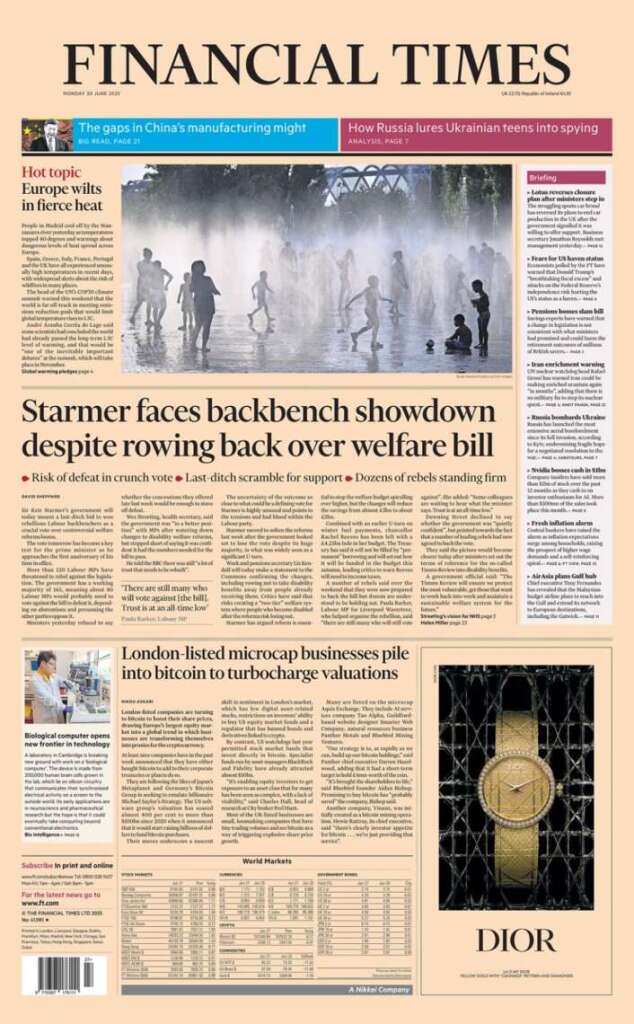
This controversy underscores the broader challenges facing the BBC as it seeks to balance its public service mission with the demands of a rapidly changing media landscape. The debate over Glastonbury is not just about one festival; it is a microcosm of the larger issues of trust, transparency, and the future direction of the BBC. As the public and policymakers continue to scrutinise the corporation’s activities, the outcome of this controversy could have far-reaching implications for the BBC’s future.
The Financial Times article titled “Starmer faces backbench showdown despite rowing back over welfare bill” highlights the significant challenges Prime Minister Keir Starmer is grappling with within his own party. Despite making concessions on the welfare bill, Starmer still faces a potential rebellion from over 100 Labour MPs. This situation underscores the deep divisions within the Labour Party regarding welfare reform, with many MPs opposing cuts to benefits.
Starmer’s government had initially proposed substantial welfare reforms, aiming to reduce the ballooning welfare bill. However, the proposed cuts faced fierce opposition from within his own party, leading to crisis talks and eventual concessions. The Prime Minister agreed to exempt existing disability claimants from the cuts, a significant retreat from his original stance. This U-turn, however, has not fully appeased the rebels, and the government remains at risk of defeat in a crucial vote.
The article also notes that Starmer’s focus on international affairs may have contributed to his domestic policy challenges. His preoccupation with global issues, including the Israel-Iran conflict, may have distracted him from the pressing concerns of his own MPs. This has led to a perception that Starmer is more attuned to international diplomacy than to the needs of his domestic constituency.
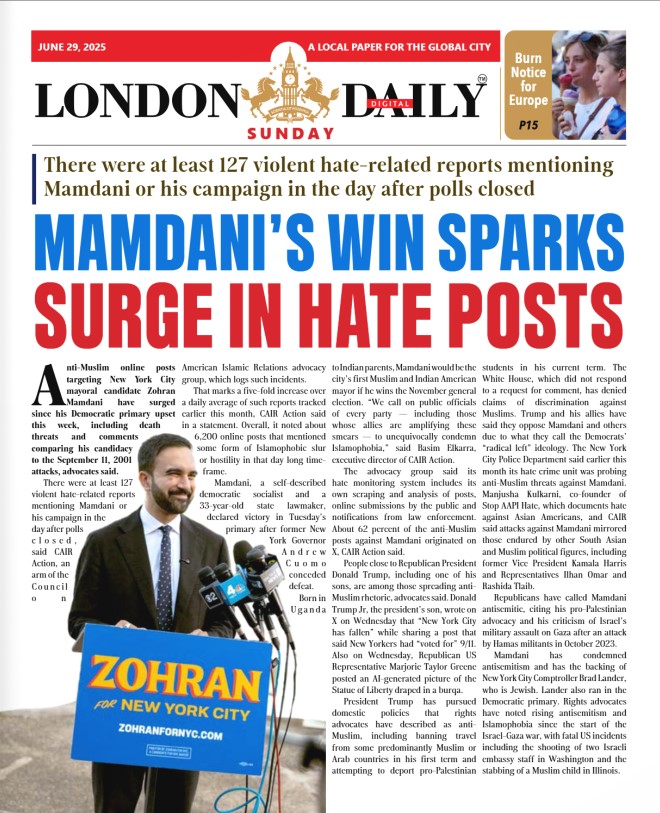
The welfare bill controversy has broader implications for Starmer’s leadership and the future of the Labour Party. It raises questions about his ability to manage internal dissent and deliver on his government’s agenda. The Prime Minister’s concessions have been seen by some as a necessary step to maintain party unity, while others view it as a sign of weakness. The outcome of this showdown will likely shape the trajectory of Starmer’s government and the Labour Party’s direction in the coming months.
The article in the London Daily titled ‘Mamdani’s Win Sparks Surge in Hate Posts’ is a stark reminder of the darker side of political victories. The piece delves into the aftermath of Mamdani’s election win, highlighting the concerning rise in hate speech and online harassment targeting the newly elected official and their supporters. It is a disheartening read, shedding light on the toxic nature of online discourse in the digital age.
The article is well-researched, providing a comprehensive overview of the incidents and the platforms where these hate posts have proliferated. It includes quotes from cybersecurity experts and social media analysts, offering insights into the mechanisms behind the surge. The narrative is engaging, with a clear and balanced tone that avoids sensationalism while still conveying the gravity of the situation.
One of the strengths of the article is its focus on the broader implications of such online hate. It goes beyond merely reporting incidents and delves into the potential long-term effects on political discourse and public safety. The inclusion of Mamdani’s response to the hate speech adds a human element, making the story more relatable and impactful.




